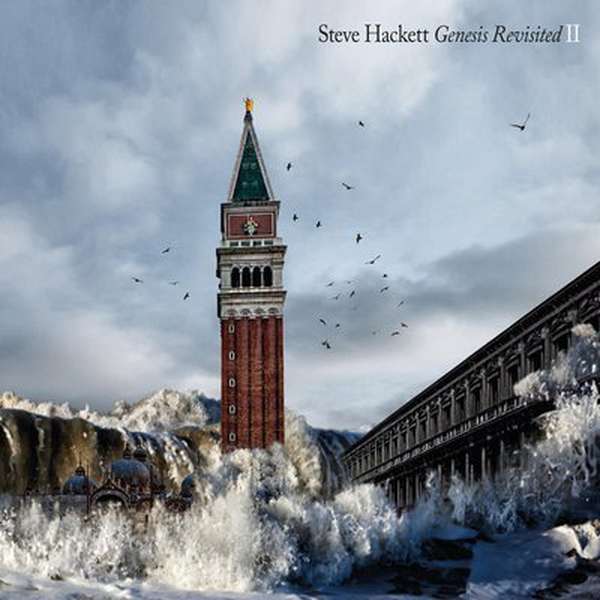This (entirely too long) review is part of my coverage of the 2013 Progressive Music Awards, on 3 September.
I fully admit, before I even listened to this album, I actively disliked it. For one, musical sequels are rarely as good as the original (as I've mentioned before). For another, it's a covers album--and we at Scene Point Blank are well familiar with how terrible those can be. If it weren't for the fact that this album, in the face of all reason, was nominated for album of the year at the 2013 Progressive Music Awards, I wouldn't have even given it a second thought. But yet, by my own incessant, completionistic drive, I felt compelled to at least give it a fair listen--and was blown away.
To catch you up to speed, Genesis were one of the biggest bands in the world back in the 1970s, and they leave a legacy today as one of the most respected progressive bands of all time. (To give you some idea, they were the second progressive band ever to be inducted to Rock and Roll Hall of Fame, ahead of names like Yes and Rush; the only reason they weren't first is because Pink Floyd is a band that exists.) As a five-piece band, generally considered their best incarnation, they released such timeless classics as Foxtrot, Selling England by the Pound, and The Lamb Lies Down on Broadway. But frontman Peter Gabriel, known for his absolutely batshit live performances, became estranged from the other band members during the recording of The Lamb, leading to his departure from the band.
As four piece, the band mellowed out just a bit from the twenty-minute epics and the two-disc concept albums, but continued to release generally complex progressive music for a few years yet. But despite their continued (if subdued) success, guitarist Steve Hackett began to feel the strain of the band's creative limitations, and found himself quitting the band shortly after the release of Wind & Wuthering.
After that, Genesis went the way of every other progressive band in the 80s and started drifting towards pop rock. While the new three-piece struggled with their identity crisis as a pop band having to cater to a progressive fan base, Hackett's first releases gave the impression of a man with unfinished business; rejected Genesis tracks would show up in his solo albums, and he even went so far as to revise a few of his favourite tracks with the band for a "cover" album, Genesis Revisited. And though he never rose quite to the prominence of Phil Collins or Peter Gabriel, Hackett still carries on his quite respectful solo career to this day.
I'm guessing that Hackett must still feel that sense of dedication or allegiance to his incarnation of Genesis, because not only is this second time revisiting their music, it's a full freaking two discs long. (And as with any progressive band, every single minute is used.) There are a few other decent motives behind this release as well: it makes the music of a legendary band more accessible to the generation who grew up with their followers like Porcupine Tree and Dream Theater, it acts as a showcase for a rogues gallery of progressive musicians so impressive that Arjen Lucassen stands in awe, and it affords Hackett the opportunity to add some polish and spitshine that would only be possible with around forty years of hindsight. While many people (myself included) may have reservations or ethical objections about getting a do-over on art, very few artists have been afforded this many opportunities to do just that, and Hackett is out to make the best of every minute he can.
Here's the first hurdle: in many ways, his first installment went for the low-hanging fruit; I mean, who doesn't want to hear classics like "Watcher of the Skies" or "Firth of Fifth"? That means when it came to the track selection this time around, by necessity, he had to reach a bit further into Genesis's discography in order to find worthy tracks. Of course, there are still a few no-brainers to be found--"Ripples" is probably the best ballad they ever wrote, and who would pass up a chance to play the solo on "The Lamia" again?--but the album by and large consists of forgotten relics, and that's much to its benefit. A lot of these songs were discarded by the band as they drifted towards pop rock, and many of them sound fresh merely because they weren't played over and over and over in the intervening decades; how many of you recall the heavily-overshadowed Lamb tracks "The Chamber of 32 Doors" or the slick combo of "Fly on a Windshield" and "Broadway Melody of 1974"?
And, generally speaking, Hackett's versions hold up--the majority of the material on Genesis Revisited II is well arranged and insightfully performed. A lot of otherwise stellar tracks that suffered from poor recordings--"Dancing With the Moonlit Knight" and "The Lamia" both come to mind--are given special attention by Hackett, who revives them into the fully realized pieces they should have been. Some of the pieces are improved by just a minor change; the female vocals on "Ripples" give it an unforeseen levity, and the "Fly on a Windshield" / "Broadway Melody of 1974" combo gets that powerfully heavy climax its always been yearning for. But the majority are simply covered with no additions other than the benefits of modern recording, and that is usually enough to improve them, like with "Return of the Giant Hogweed", the oft-neglected "Eleventh Earl of Mar", and the closing trio of Wind & Wuthering. (Actually, Hackett's "Return of the Giant Hogweed" sounds strikingly familiar to Transatlantic's cover, not in the least because he's recording with both Neal Morse and Ronnie Stolt.)
"The Musical Box" in particular sounds all the more powerful now than it did in its time. The original song had this sense of sinister heaviness that it couldn't quite capture, and Hackett's hand has made sure that its every bit as forceful as it was envisioned. But the best cover has to be the unexpected delight of Steven Wilson's "Can-Utility and the Coastliners", an otherwise unremarkable piece of album filler somehow turned into the most emotionally affecting ballad he's performed. I really don't understand how that happened (short of Wilson just being godlike at what he does), but I'll take it.
Of course, on a collection this huge, there are naturally going to be a few missteps. "The Chamber of 32 Doors" in particular is surprisingly vapid and devoid of sensibility, acting as an absolutely terrible album opener. A bunch of other tracks just suffer from poor arrangements; "Blood on the Rooftops" and "Entangled" feel so close to their original versions that listening to them feels uninteresting, and the reworking of "Please Don't Touch" doesn't rescue it from its own blandness. But these are the exceptions to the rule; the majority of the songs here are appreciably improved from their original versions.
Those of you already familiar with the track listing will notice that I've avoided talking about the elephant in the, er, album: the legendary epic "Supper's Ready". And while that's partially out of respect and partially out of a 'save the best for last' mentality, there really is a lot to say about this version. I mean, it takes chutzpah to take a band's most famous song, considered literally perfect by most, and not just cover it, but actively make compositional and stylistic changes to it. You don't mess with perfection, and if you're going to even think about trying, you'd better bring your A game.
And yet, for all of the weight it must hold, Hackett's version is done perfectly. Not only does he do this monumentous track justice, he makes it feel welcoming, like receiving a visit from an old friend--things may have changed on the outside, but that only helps you notice everything that's stayed perfectly the same. I expected to cringe and cry my way through a wrecked vision of a giant, and yet, I found myself having tons of fun singing along with the lyrics I knew so well. The track is recorded and updated not with the wanton disregard of a normal cover, but with respect and gratitude, clarifying the moments that were just a touch unclear, emphasizing the crescendos that could've hit just a bit harder, and colouring the expressive passages just a little brighter. Even more so than the original, the song is an emotional punch to the gut, so much so that by the time I reached those last few bars, I felt a more profound relief than I could have imagined.
But it's the small touches that make this song fantastic, like how you can hear how much fun Hackett is having with the "Ikhnaton and Itsacon" guitar solo, or how beautifully expressive Mikael Åkerfeldt's melancholy crooning is, or the added guitar theatrics of "Apocalypse in 9/8" creating an absolutely explosive finale. Hackett took a huge risk in recording this, and it paid off splendidly--"Supper's Ready" feels every bit as grand as it was in its heyday, and is vastly improved by Hackett's revisiting.
(Oh, and "Horizons" isn't any different at all, but I suppose if you're going to cover the B-side of Foxtrot, then you might as well do it right.)
One of the few downsides of this album is that Hackett takes very few risks in arranging the source material. While that's understandable in some cases (you don't mess with "Supper's Ready"), a lot of the pieces here were ripe for rearrangement. It feels like a missed opportunity, given that the few compositional risks he does take tend to be very unintrusive and minimized, not to mention how crazy some of the arrangements on Genesis Revisited got (his version of "Firth of Fifth" was nuts). But, to be fair, this still worked out for a lot of his covers, so it's not as if anything undesirable came of it.
The only other downside of note is how unusually poor some of the guest performances are. While there are a number of absolutely fantastic guests (Wilson and Åkerfeldt both come to mind), an alarming number of them, almost entirely in the vocals, are incredibly poor. I think a lot of the problem stems from the guests trying too hard to imitate Gabriel's vocal style; instead of taking the pieces in their own direction, it seems like many are compelled to recapture his distinctive voice, resulting in a number of very poor, aurally grating vocal lines. But these are generally side notes to the fantastic work going on literally everywhere else in the album, so I suppose that can be forgiven.
As a final note, while it may seem like Hackett has cleared out Genesis's discography, there are still some really notable oversights in his track selection. Though I can understand passing over "The Cinema Show", given that it's a very heavily Banks-oriented piece, other live warhorses like "Get 'Em Out By Friday" and "In the Cage" would've greatly benefited from a modern reimagining and production overhaul. I'm actually surprised at Hackett's selections off The Lamb, given that there are still fantastic songs like "Back in N.Y.C.", "It", and the title track that evaded his eye. Not to mention that he also overlooked almost all of the fantastic pop-oriented pieces from his era like "The Carpet Crawlers", "Counting Out Time", and "A Trick of the Tail". Actually, come to think of it, that's enough material for a third instalment. Hackett, if you can keep up this fantastic level of quality, get on it!
If there's anything clear from Genesis Revisited II, it's that Hackett loved his former band, and he must have been sad to see it go the way it did. ("SHE SEEMS TO HAVE AN INVISIBLE TOUCH, YEAH!") It's very telling that I went into this album wanting to hate it, and by the time it finished, I had been so struck by is excellence that I was forced to admit my enjoyment. I still have personal reservations about nominating a covers album for an "album of the year" award, but if there ever was one that deserved the consideration, this would be it.
Oh, and sorry for writing a whole goddamn essay.
Recommended if you like: I know there's an obvious choice here, but it's just not coming to me.



